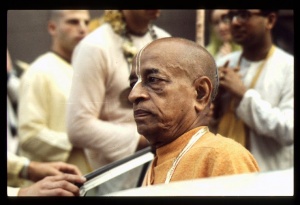SB 9.7.1: Difference between revisions
m (1 revision(s)) |
(Vanibot #0054 edit - transform synonyms into clickable links, which search similar occurrences) |
||
| (One intermediate revision by one other user not shown) | |||
| Line 1: | Line 1: | ||
{{info | {{info | ||
|speaker= | |speaker=Śukadeva Gosvāmī | ||
|listener=King | |listener=King Parīkṣit | ||
}} | }} | ||
[[Category:Srimad-Bhagavatam - Canto 09 Chapter 07|s01 ]] | |||
[[Category:Bhagavatam Verses Spoken by Sukadeva Gosvami - Vanisource|090701]] | |||
<div style="float:left">'''[[Srimad-Bhagavatam]] - [[SB 9|Ninth Canto]] - [[SB 9.7: The Descendants of King Mandhata|Chapter 7: The Descendants of King Māndhātā]]'''</div> | |||
<div style="float:right">[[File:Go-previous.png|link=SB 9.7 Summary]] '''[[SB 9.7 Summary]] - [[SB 9.7.2]]''' [[File:Go-next.png|link=SB 9.7.2]]</div> | |||
{{RandomImage}} | |||
==== TEXT 1 ==== | ==== TEXT 1 ==== | ||
<div | <div class="verse"> | ||
śrī-śuka uvāca | :śrī-śuka uvāca | ||
māndhātuḥ putra-pravaro | :māndhātuḥ putra-pravaro | ||
yo 'mbarīṣaḥ prakīrtitaḥ | :yo 'mbarīṣaḥ prakīrtitaḥ | ||
pitāmahena pravṛto | :pitāmahena pravṛto | ||
yauvanāśvas tu tat-sutaḥ | :yauvanāśvas tu tat-sutaḥ | ||
hārītas tasya putro 'bhūn | :hārītas tasya putro 'bhūn | ||
māndhātṛ-pravarā ime | :māndhātṛ-pravarā ime | ||
</div> | </div> | ||
| Line 20: | Line 25: | ||
==== SYNONYMS ==== | ==== SYNONYMS ==== | ||
<div | <div class="synonyms"> | ||
śrī-śukaḥ | ''[//vanipedia.org/wiki/Special:VaniSearch?s=śrī&tab=syno_o&ds=1 śrī]-[//vanipedia.org/wiki/Special:VaniSearch?s=śukaḥ&tab=syno_o&ds=1 śukaḥ] [//vanipedia.org/wiki/Special:VaniSearch?s=uvāca&tab=syno_o&ds=1 uvāca]'' — Śrī Śukadeva Gosvāmī said; ''[//vanipedia.org/wiki/Special:VaniSearch?s=māndhātuḥ&tab=syno_o&ds=1 māndhātuḥ]'' — of Māndhātā; ''[//vanipedia.org/wiki/Special:VaniSearch?s=putra&tab=syno_o&ds=1 putra]-[//vanipedia.org/wiki/Special:VaniSearch?s=pravaraḥ&tab=syno_o&ds=1 pravaraḥ]'' — the prominent son; ''[//vanipedia.org/wiki/Special:VaniSearch?s=yaḥ&tab=syno_o&ds=1 yaḥ]'' — the one who; ''[//vanipedia.org/wiki/Special:VaniSearch?s=ambarīṣaḥ&tab=syno_o&ds=1 ambarīṣaḥ]'' — by the name Ambarīṣa; ''[//vanipedia.org/wiki/Special:VaniSearch?s=prakīrtitaḥ&tab=syno_o&ds=1 prakīrtitaḥ]'' — celebrated; ''[//vanipedia.org/wiki/Special:VaniSearch?s=pitāmahena&tab=syno_o&ds=1 pitāmahena]'' — by his grandfather Yuvanāśva; ''[//vanipedia.org/wiki/Special:VaniSearch?s=pravṛtaḥ&tab=syno_o&ds=1 pravṛtaḥ]'' — accepted; ''[//vanipedia.org/wiki/Special:VaniSearch?s=yauvanāśvaḥ&tab=syno_o&ds=1 yauvanāśvaḥ]'' — named Yauvanāśva; ''[//vanipedia.org/wiki/Special:VaniSearch?s=tu&tab=syno_o&ds=1 tu]'' — and; ''[//vanipedia.org/wiki/Special:VaniSearch?s=tat&tab=syno_o&ds=1 tat]-[//vanipedia.org/wiki/Special:VaniSearch?s=sutaḥ&tab=syno_o&ds=1 sutaḥ]'' — the son of Ambarīṣa; ''[//vanipedia.org/wiki/Special:VaniSearch?s=hārītaḥ&tab=syno_o&ds=1 hārītaḥ]'' — by the name Hārīta; ''[//vanipedia.org/wiki/Special:VaniSearch?s=tasya&tab=syno_o&ds=1 tasya]'' — of Yauvanāśva; ''[//vanipedia.org/wiki/Special:VaniSearch?s=putraḥ&tab=syno_o&ds=1 putraḥ]'' — the son; ''[//vanipedia.org/wiki/Special:VaniSearch?s=abhūt&tab=syno_o&ds=1 abhūt]'' — became; ''[//vanipedia.org/wiki/Special:VaniSearch?s=māndhātṛ&tab=syno_o&ds=1 māndhātṛ]'' — in the dynasty of Māndhātā; ''[//vanipedia.org/wiki/Special:VaniSearch?s=pravarāḥ&tab=syno_o&ds=1 pravarāḥ]'' — most prominent; ''[//vanipedia.org/wiki/Special:VaniSearch?s=ime&tab=syno_o&ds=1 ime]'' — all of them. | ||
</div> | </div> | ||
| Line 27: | Line 32: | ||
==== TRANSLATION ==== | ==== TRANSLATION ==== | ||
<div | <div class="translation"> | ||
Śukadeva Gosvāmī said: The most prominent among the sons of Māndhātā was he who is celebrated as Ambarīṣa. Ambarīṣa was accepted as son by his grandfather Yuvanāśva. Ambarīṣa's son was Yauvanāśva, and Yauvanāśva's son was Hārīta. In Māndhātā's dynasty, Ambarīṣa, Hārīta and Yauvanāśva were very prominent. | Śukadeva Gosvāmī said: The most prominent among the sons of Māndhātā was he who is celebrated as Ambarīṣa. Ambarīṣa was accepted as son by his grandfather Yuvanāśva. Ambarīṣa's son was Yauvanāśva, and Yauvanāśva's son was Hārīta. In Māndhātā's dynasty, Ambarīṣa, Hārīta and Yauvanāśva were very prominent. | ||
</div> | </div> | ||
__NOTOC__ | |||
<div style="float:right; clear:both;">[[File:Go-previous.png|link=SB 9.7 Summary]] '''[[SB 9.7 Summary]] - [[SB 9.7.2]]''' [[File:Go-next.png|link=SB 9.7.2]]</div> | |||
__NOTOC__ | |||
__NOEDITSECTION__ | |||
Latest revision as of 16:14, 19 February 2024

A.C. Bhaktivedanta Swami Prabhupada
TEXT 1
- śrī-śuka uvāca
- māndhātuḥ putra-pravaro
- yo 'mbarīṣaḥ prakīrtitaḥ
- pitāmahena pravṛto
- yauvanāśvas tu tat-sutaḥ
- hārītas tasya putro 'bhūn
- māndhātṛ-pravarā ime
SYNONYMS
śrī-śukaḥ uvāca — Śrī Śukadeva Gosvāmī said; māndhātuḥ — of Māndhātā; putra-pravaraḥ — the prominent son; yaḥ — the one who; ambarīṣaḥ — by the name Ambarīṣa; prakīrtitaḥ — celebrated; pitāmahena — by his grandfather Yuvanāśva; pravṛtaḥ — accepted; yauvanāśvaḥ — named Yauvanāśva; tu — and; tat-sutaḥ — the son of Ambarīṣa; hārītaḥ — by the name Hārīta; tasya — of Yauvanāśva; putraḥ — the son; abhūt — became; māndhātṛ — in the dynasty of Māndhātā; pravarāḥ — most prominent; ime — all of them.
TRANSLATION
Śukadeva Gosvāmī said: The most prominent among the sons of Māndhātā was he who is celebrated as Ambarīṣa. Ambarīṣa was accepted as son by his grandfather Yuvanāśva. Ambarīṣa's son was Yauvanāśva, and Yauvanāśva's son was Hārīta. In Māndhātā's dynasty, Ambarīṣa, Hārīta and Yauvanāśva were very prominent.